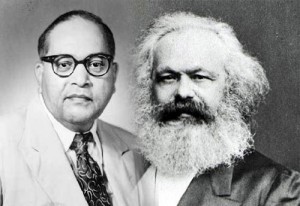Call for Papers
Milestone Education Review (The Journal of Ideas on Educational & Social Transformation) ISSN: 2278-2168
Special Issue on “Marx and Ambedkar for Indian Social Change”
Year 09, No. 01 (April, 2018)
Respected Faculty/Scholar/Professor,
Milestone Education Review (The Journal of Ideas on Educational & Social Transformation) is an online peer-reviewed bi-annual journal of Milestone Education Society (Regd.) Pehowa (Kurukshetra). For us education refers to any act or experience that has a formative effect on the mind, character, or physical ability of an individual. The role of education must be as an instrument of social change and social transformation. Social transformation refers to large scale of social change as in cultural reforms and transformations. The first occurs with the individual, the second with the social system. This journal offers an opportunity to all academicians including educationist, social-scientists, philosophers and social activities to share their views. Each issue contains about 100 pages.

About Present Issue:
Karl Marx, in full Karl Heinrich Marx (born May 5, 1818, Trier and died March 14, 1883, London, England) was a philosopher, revolutionary, sociologist, historian, and economist. He published The Communist Manifesto and Das Kapital, anticapitalist works that form the basis of Marxism. It was Capital’s 150th anniversary in autumn 2017, the 170th anniversary of the Communist Manifesto will be in February 2018, and it would have been Karl Marx’s 200th birthday in May 2018. The Communist Party of the Philippines calls on all Filipino workers to start a year-long commemoration and celebration of Marx’s 200th birthday on May 5, 2018. The whole revolutionary movement must salute Karl Marx’ and Marxism’s great role in history and in the continuing world struggle for the emancipation of the proletariat and the entire humanity. This celebration is of great relevance to the working class, from politics to philosophy to academics as Karl Marx made a lasting imprint on the face of history. The Centre has also an intention to commemorate the 200 years of Karl Marx by various activities including essay competition, seminar, special issues and books on this great thinker.
Karl Marx was the first thinker to draw sharp attention to the highly deleterious impact of caste on Indian society and its causal link with the relations of production. In his famous essay on “The Future Results of British Rule in India” Karl Marx characterized the Indian castes as “the most decisive impediment to India’s progress and power”. Marx clearly and causally connected the archaic social formation of caste in India with the relations of production. It followed logically that the abolition of the caste hierarchy and the oppression and exploitation of the ‘lower’ castes could not be separated from the Marxian form of class struggle. The adivasis or indigenous people of ancient India suffered more or less the same socioeconomic disabilities as the atisudras, and were virtually indistinguishable from the latter with regard to their status in relation to the socioeconomic structure of chaturvarnya. They were also both geographically isolated and socially marginalized, and relegated to the bottom of the socioeconomic pyramid. There is abundant evidence in the dharmasastras and Sanskrit literature to show that these indigenous people were also treated as untouchables. Ideologically, one can place Ambedkar in the leftist traditions, though not in its traditional forms. He was one of the few people in modern India who had developed a home-grown genre of Marxism and for Ambedkar this stood in comparison with the ideology of Buddhism – a peculiar, yet profound blend that is characteristic of an Indian philosopher. In his essay titled “Buddha or Karl Marx”, Ambedkar compared the common ideals of Buddha and Marx and submitted an ultimate analysis that socialism can only be sustained if it walks on the path lay out by the Buddha. According to him, Buddhism was “an ultimate aid to sustain Communism when force is withdrawn” and so he criticised Lenin because he failed to deliver ‘liberty and fraternity’ in the pursuit of equality. He declared that: “Equality will be of no value without fraternity or liberty. It seems that the three can coexist only if one follows the way of the Buddha. Communism can give one but not all.” It is indeed the contribution of Dr. B.R. Ambedkar that the commitment towards liberty, fraternity and equality through the means of non-violence and democracy, has become a central characteristic of our constitution. He categorically stated while addressing the constituent assembly (November 25, 1949) that, “Political democracy cannot last unless there lies at the base of it social democracy, which means, a way of life which recognize liberty, equality and fraternity as the principles of life.” In this sense there will be a great need of study both revolutionary figures to study on the same platform and to their relevance in the Indian social change. This is a special call for papers for Milestone Education Review, Year 09, No. 01 (April, 2018) issue.
Last date for paper submission: 10th March, 2018 Format of Submission: The paper should be typewritten preferably in Times New Roman with 12 font size (English) and Kruti Dev (10) with 14 font size (Hindi) in MS-Word 2003 to 2010 and between 2500 to 3000 words. They should be typed on one side of the paper, double spaced with ample margins. The authors should submit the hard copy along with a CD and a copyright form to be sent to the editorial address. Originality of Work: Only papers which have not been published elsewhere will be considered. Proofs will be sent to the authors if there is sufficient time to do so. An undertaking via a “Forwarding Letter” be submitted alongwith the paper.
Reference Style: Notes and references should appear at the end of the research paper/chapter. Citations in the text and references must correspond to each other; do not over reference by giving the obvious/old classic studies or the irrelevant. CPPIS follows The Chicago Manual of Style, 16th Edition. The Chicago Manual of Style presents two basic documentation systems: (1) notes and bibliography and (2) author-date. Choosing between the two often depends on subject matter and the nature of sources cited, as each system is favored by different groups of scholars. The notes and bibliography style is preferred by many in the humanities. The author-date system has long been used by those in the physical, natural, and social sciences. CPPIS follows the first system i.e. Notes and Bibliography. For detail information downloads our “CPPIS Manual for Contributors and Reviewers” from below given links:
http://www.scribd.com/doc/137190047/CPPIS-Manual-for-Contributors-Reviewershttps://www.academia.edu/8215663/CPPIS_Manual_for_Contributors_and_Reviewers
All contributions to the Journal, other editorial enquiries and books for reviews are to be sent to: Dr. Desh Raj Sirswal, Near Guaga Maidi, Balmiki Basti, H.No.255/6, Pehowa, Distt. Kurukshetra (HARYANA)-136128 (India) Mobile No.09896848775, 08288883993, E-mail: cppiskkr@gmail.com, mses.02@gmail.com, Website: http://milestonereview.webs.com
Link:
Special Issue on “Marx and Ambedkar for Indian Social Change”










